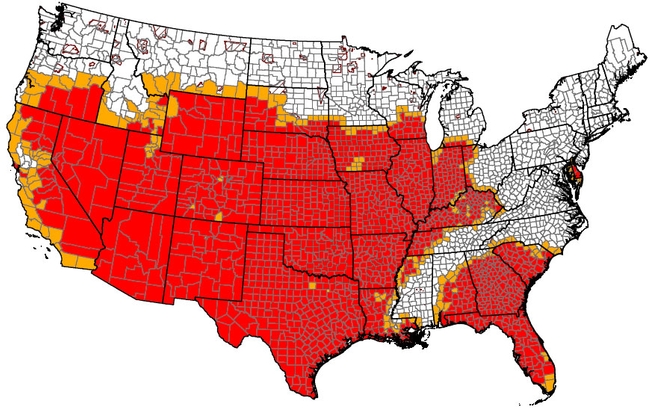Posts Tagged: drought
Droughtless in Seattle
It’s been both interesting and frightening watching the drought unfold across the country this spring and summer. It’s a very serious situation, and may be a harbinger and an affirmation of climate change. I believe it is.
Has it dawned on anyone else that the dry, hot summer the rest of the country has suffered through is exactly like what we Californians endure most years? Could it be the rest of the country will soon share our Mediterranean climate, of relatively wet, warm winters and summers of drought? Now THAT’s something to mull.
Of course, our West Coast climate is changing, too. Spring seems to arrive and leave sooner than in years past. The winter and spring rains seem to fall torrentially, rather than a few days here, followed by a few days to soak in, and on and on. And the often-sparse Sierra snowpack melts sooner in the year.
But because we in the West are adapted to our summer-drought cycle, we have built a good system of water storage to catch those spring rains and snowmelt. The Midwest, South and East Coast do not have this same system. No need when you usually have plenty of summer rain that soaks into the soil and keeps the rivers running high.
A recent family vacation to Seattle was an eye-opener for me. While there, I saw nightly news video of the drought-ravaged Midwest. Even the mighty Mississippi River was too low for some maritime traffic. Graphics were aired showing the extent of the drought. About the only place on the map of the continental U.S. that was not in drought was western Washington State (including Seattle), which has had an unusually wet and cool summer.
Maybe we should have looked at property while we were there. I could see a land rush happening in the region; it’s where most of the water is.

No drought worries in lush, water-filled Century Square in downtown Seattle. Katie, Christopher and Emelyn Rico of Vacaville visited there recently. (Photo by Kathy Thomas-Rico)
Some farmers won't suffer due to drought
National Public Radio's Planet Money pointed out that many U.S. farmers who are losing their crops due to drought won't suffer financially because they have government-subsidized crop insurance.
U.S. taxpayers spend about $7 billion a year on crop insurance, the story said.
Daniel Sumner, director of the UC Agricultural Issues Center and professor in the Department of Agriculture and Resource Economics at UC Davis, said he isn't in favor of the government giving farmers subsidies.
Ski resorts suffered last winter when there wasn't a lot of snow. The government doesn't say, "Sorry you didn't have a lot of skiers. Here's a check," Sumner said.
Valley farmers wary of new water rules
Mark Grossi, The Fresno Bee
A UC study released in March says 96 percent of the Central Valley's groundwater contamination problem comes from agriculture, and it threatens the drinking water of 250,000 valley residents. The study suggests better monitoring and management of fertilizers are needed to ease the problem. By using only the amount of fertilizer needed by plants, the nitrates would be controlled. Leaders of water-user groups say farmers already aim for that goal and have become far more efficient. Yet, the state assumes all farmers are discharging to the groundwater, said David Orth, general manager of the Kings River Conservation District and coordinator of a coalition representing farmers in the four-county area. "In other words, everybody is guilty until they prove themselves to be innocent," he said.
Experts: Rinds one reason for salmonella-infected cantaloupe
Scott Kanowsky, WBEZ 91.5
Cantaloupe rinds could be one reason behind a recent salmonella outbreak linked to the fruit. "It's much easier to scrub the surface of a honeydew melon than it is to scrub the surface of a cantaloupe and actually remove microorganisms that are on the surface,” said Linda Harris, UC Cooperative Extension specialist in the Department of Food Science and Technology at UC Davis.
Corn should be for food, not fuel, two experts say
A sweeping drought in the Midwest has pushed up corn commodity prices and prompted a UC agricultural economist and his colleague to call for federal authorities to suspend renewable-fuel standards that require the blending of 13.2 billion gallons of corn ethanol with gasoline this year
In an op-ed published in the New York Times, Colin Carter, a professor in the Department of Agricultural and Resource Economics at UC Davis, and Henry Miller, a physician and a fellow in scientific philosophy and public policy at the Hoover Institution, said the U.S. Environmental Protection Agency could divert vast amounts of corn from inefficient ethanol production back into the food chain.
"The price of corn is a critical variable in the world food equation, and food markets are on edge because American corn supplies are plummeting," they wrote. "The combination of the drought and American ethanol policy will lead in many parts of the world to widespread inflation, more hunger, less food security, slower economic growth and political instability, especially in poor countries."
Carter also spoke about the issue on the Capital Public Radio program Insight. He said the rising corn prices will likely have the biggest impact in California on feed lot operators who feed corn and soybean meal to cattle. Dairies will also be hit very hard.
Feeling the economic pain of drought
Reduced water allowances for farmers could mean layoffs and other economic impacts, says an article in the Wall Street Journal by Jim Carlton.
The article reported that some farmers have been told to expect just 30 percent of their allotments. In response to water cutbacks, many farmers must reduce planting and leave some fields fallow.
The article referenced a UC Davis study, co-authored by Richard Howitt, of 2009 water cutbacks that resulted in "285,000 acres going fallow and the loss of 9,800 agricultural jobs, for a $340 million loss in farm-related revenues."
California's rain is locked up in Alaska snow
Precipitation that would normally head toward California along the Pacific jet stream has for weeks veered north, burying Alaska in record snow, said an article by San Jose Mercury News reporter Lisa Kreiger. The story appeared yesterday in the Contra Costa Times.
The weather trend has left California drenched in sun this winter, but for many, sunny skies have worn out their welcome.
In the Central Valley, stock ponds are running dry -- and cows drink 10 to 15 gallons a day. Some ranchers are considering trucking in water or culling their herds, said Yuba City-based UC Cooperative Extension farm advisor Glenn Nadar. He predicts a surge in milk and beef prices.
Orchardists worry about their almond trees, whose buds are swelling -- but roots are dry. Winter wheat is also parched. To help, some water districts are diverting water into their canals.
"We're irrigating, which is unheard of," said farm advisor Franz Niederholzer, with UC's Cooperative Extension in Sutter and Yuba counties.

California ranchers may need to truck in water for their cattle.



